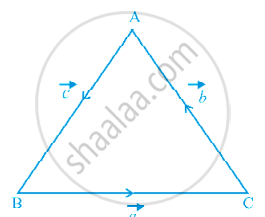Advertisements
Advertisements
प्रश्न
Prove that in a ∆ABC, `sin"A"/"a" = sin"B"/"b" = sin"C"/"c"`, where a, b, c represent the magnitudes of the sides opposite to vertices A, B, C, respectively.
उत्तर
Let the three sides of the triangle BC, CA and AB be represented by `vec"a", vec"b"` and `vec"c"`, respectively .....[From the figure]
We have `vec"a" + vec"b" + vec"c"` = 0
i.e., `vec"a" + vec"b" = -vec"c"`
Which pre cross multiplying by `vec"a"`, and post cross multiplying by `vec"b"`, gives `vec"a" xx vec"b" = vec"c" xx vec"a"`
And `vec"a" xx vec"b" = vec"b" xx vec"c"` respectively.
Therefore `vec"a" xx vec"b" = vec"b" xx vec"c" = vec"c" xx vec"a"`
⇒ `|vec"a" xx vec"b"| = |vec"b" xx vec"c"|`
= `|vec"c" xx vec"a"|`
⇒ `|vec"a"||vec"b"|sin(pi - "C") = |vec"b"||vec"c"|sin(pi - "A")`
= `|vec"c"||vec"a"|sin(pi - "B")`
⇒ ab sin C = bc sinA = ca sinB
Dividing by abc, we get
`sin"C"/"c" = sin"A"/"a" = sin"B"/"b"`
i.e. `sin"A"/"a" = sin"B"/"b" = sin"C"/"c"`
APPEARS IN
संबंधित प्रश्न
Find `|veca| and |vecb|`, if `(veca + vecb).(veca -vecb) = 8 and |veca| = 8|vecb|.`
Find a vector of magnitude 5 units, and parallel to the resultant of the vectors `veca = 2i + 3hatj - hatk` and `vecb = hati - 2hatj + hatk`.
If `veca, vecb, vecc` are mutually perpendicular vectors of equal magnitudes, find the angle which `veca + vecb + vecc`make with `veca or vecb or vecc`
Find the magnitude of the vector \[\vec{a} = 2 \hat{i} + 3 \hat{j} - 6 \hat{k} .\]
If \[\vec{a} = \hat{i} + \hat{j} + \hat{k} , \vec{b} = 4 \hat{i} - 2 \hat{j} + 3 \hat{k} \text { and } \vec{c} = \hat{i} - 2 \hat{j} + \hat{k} ,\] find a vector of magnitude 6 units which is parallel to the vector \[2 \vec{a} - \vec{b} + 3 \vec{c .}\]
A vector \[\vec{r}\] is inclined at equal angles to the three axes. If the magnitude of \[\vec{r}\] is \[2\sqrt{3}\], find \[\vec{r}\].
Define "zero vector".
Write a vector of magnitude 12 units which makes 45° angle with X-axis, 60° angle with Y-axis and an obtuse angle with Z-axis.
Write the length (magnitude) of a vector whose projections on the coordinate axes are 12, 3 and 4 units.
Write two different vectors having same magnitude.
Write a vector in the direction of vector \[5 \hat{i} - \hat{j} + 2 \hat{k}\] which has magnitude of 8 unit.
Find a vector in the direction of vector \[2 \hat{i} - 3 \hat{j} + 6 \hat{k}\] which has magnitude 21 units.
Find all vectors of magnitude `10sqrt(3)` that are perpendicular to the plane of `hat"i" + 2hat"j" + hat"k"` and `-hat"i" + 3hat"j" + 4hat"k"`
The magnitude of the vector `6hat"i" + 2hat"j" + 3hat"k"` is ______.
A vector `vec"r"` is inclined at equal angles to the three axes. If the magnitude of `vec"r"` is `2sqrt(3)` units, find `vec"r"`.
Find a vector of magnitude 6, which is perpendicular to both the vectors `2hat"i" - hat"j" + 2hat"k"` and `4hat"i" - hat"j" + 3hat"k"`.
The vector in the direction of the vector `hat"i" - 2hat"j" + 2hat"k"` that has magnitude 9 is ______.
If the sum of two-unit vectors is a unit vector, then the magnitude of their difference is
Two equal forces acting at a point with an angle of 60° between them, if the resultant is equal `30sqrt(3)N`, the magnitude of the force will be
The area under a velocity-time curve represents the change in ______?
Which of the following statements is false about forces/ couple?
The magnitude of the vector `6hati - 2hatj + 3hatk` is ______.
Find a vector of magnitude 20 units parallel to the vector `2hati + 5hatj + 4hatk`.
Find a vector of magnitude 9 units and perpendicular to the vectors.
`veca = 4hati - hatj + hatk` and `vecb = -2hati + hatj - 2hatk`
